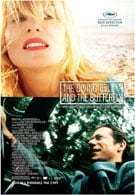It sounds like paint-by-numbers Oscar bait: the true story of a man paralyzed by a stroke at the height of his career, unable to move except for blinking his left eye. Using a system developed by his nurses, the man formerly driven only by the superficial blinks out, letter by letter, a memoir of aching beauty. He does more than overcome his disability; he takes advantage of it, speaking from inside his immobile body and creating an entirely unique work of art.
Director Julian Schnabel, however, has no interest in making Oscar bait, though his gorgeous film The Diving Bell and the Butterfly has certainly earned attention. Schnabel, an artist before he was a filmmaker, has adapted Jean-Dominique Bauby’s memoir of the same name with an eye toward the art of his story, the intense visuals and imagination that Bauby described as his saving grace once he was trapped inside his paralyzed body, what the doctors called “locked-in syndrome.” What freed Bauby frees Schnabel as well, allowing him to employ the kind of visual poetry and powerful metaphor that would be overwhelming, even mawkish, within a less powerful story. With a funny and tender script by Ronald Harwood and a devoted performance from his lead actor, Schnabel has made a clear-eyed, intelligent, but genuinely uplifting film.
The first 40 or so minutes of the film are seen entirely from Bauby's (Mathieu Amalric) point-of-view, a risky technique that pays off in the way it links the audience to Bauby's unimaginable condition. We wake up with him from the stroke and share his realization that he can no longer speak; we watch from the inside as his immobile right eye is sewn shut, hearing his silent protests. Janusz Kaminski’s cinematography is instrumental here, blurring the edges and bleeding the colors to replicate the fuzziness of waking up from a coma. Trapped inside Bauby’s mind we are as desperate to escape as he is, and we both welcome what comes next.
The true elegance of Schnabel’s film comes in when Bauby, sick of lamenting his condition, reclaims his imagination as his key to salvation. The looming faces of doctors and nurses are interspersed with everything from memories of his children to pop culture icons he re-imagines as himself (reminiscing about his youthful beauty, he stops for a moment to shout “That's Marlon Brando, not me!”). He fantasizes about his beautiful nurses and sees panoramic vistas, in some of the most breathtaking images in this, or any, film.
As Bauby starts to receive visitors, old friends, his girlfriend and their children, he cannot get over the revulsion he feels with himself-- “Now they know their father is a zombie,” he says of his kids. As he mopes, a devoted series of nurses develop their alphabet system; Bauby, with no other choice, participates. His first sentence? “I want to die.” As he comes to term with his condition, though, and realizes opportunity for tapping into his rich imagination it has afforded him-- spectacularly symbolized by stock footage of glaciers splitting apart-- he prepares to write his book, and the mordant voice-over changes to Bauby’s own poetic language.
A series of flashbacks gives clues about Bauby’s life before the stroke: though he was clearly a high-profile figure, most of the moments are prosaic--shaving his elderly father (a wonderful Max von Sydow), taking a road trip with an old girlfriend he no longer loves. It can be easy to think of people who bravely survive tragedy as being a certain kind of person, unusually strong or empathetic. These scenes with Bauby prove he was nothing of the sort--occasionally arrogant and misguided, certainly not an inspirational story. Schnabel’s earlier films Before Night Falls and Basquiat have told of men who overcome obstacles to make their art; here, he gives us a man who became an artist only because of these obstacles.
The Diving Bell and the Butterfly is a story about a man who is trapped, but the film is so stuffed with visual poetry and moving turns of phrase that it practically takes flight. Jean-Dominique Bauby referred to his body as a “diving bell”-an old-fashioned, immensely heavy diving suit-and his imagination as the butterfly; thanks to Schnabel's inventive telling of Bauby's haunting story, each has handed us a butterfly of our own.
Your Daily Blend of Entertainment News
Staff Writer at CinemaBlend


